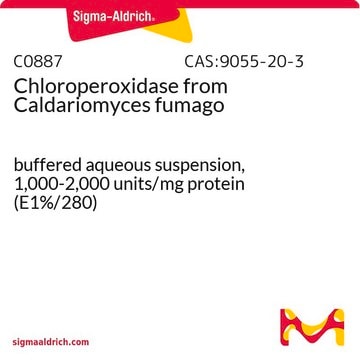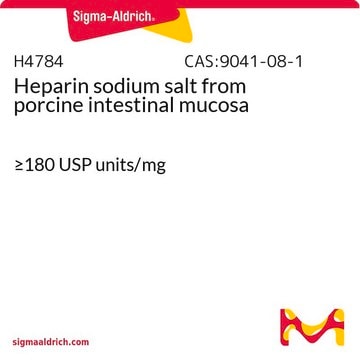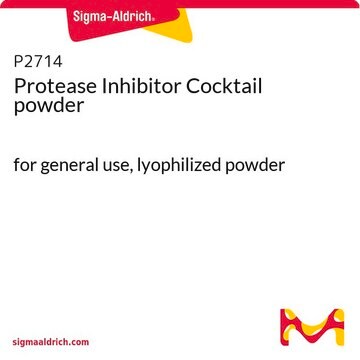推荐产品
表单
buffered aqueous suspension
分子量
42 kDa
浓度
≥3,000 units/mL
运输
wet ice
储存温度
2-8°C
正在寻找类似产品? 访问 产品对比指南
一般描述
氯过氧化物酶是由真菌分泌的一种含血红素的糖蛋白。氯过氧化物酶(CPO)是一种以高铁血红素IX为辅基的胞外血红素糖酶。[1]
应用
在 131 I 离子标记研究、蛋白质溴化和 36 Cl 标记大分子的长期分离程序中,可作为乳过氧化物酶的有效替代品。
它已被用于研究聚合物纳米反应器中的生物催化氧化。[2]
氯过氧化物酶(来自Caldariomyces fumagois)在131I标记和蛋白质溴化和长期分离程序的大分子36Cl标记中,可作为乳过氧化物酶的有效替代品。 它已用于研究聚合物纳米反应器中的生物催化氧化[2]。
生化/生理作用
氯过氧化物酶(CPO)由真菌分泌产生,具有广谱的化学反应性。它是一种依赖过氧化物的氯化酶,也催化过氧化物酶的脱氢、过氧化氢酶的过氧化氢(H2O2)降解和细胞色素P450的氧原子插入反应。该酶具有类似于细胞色素P450的磁性和光谱特性。来源于Caldariomyces fumago的氯过氧化物酶可氯化多环芳烃(PAH)等芳香烃类化合物。氯过氧化物酶具有潜在健康风险,因其致癌和致突变性而又在环境中广泛散布。[3]
单位定义
25°C、pH 2.75、存在氯化钾和 H2O2 时,1 个单位每分钟将催化 1.0 μmol 的单氯二甲基酮转化为二氯二甲基酮。
外形
0.1 M 磷酸钠中的粗混悬液,pH 值约为 4.5
警示用语:
Danger
危险声明
预防措施声明
危险分类
Resp. Sens. 1
储存分类代码
10 - Combustible liquids
WGK
WGK 3
闪点(°F)
Not applicable
闪点(°C)
Not applicable
个人防护装备
Eyeshields, Gloves, multi-purpose combination respirator cartridge (US)
历史批次信息供参考:
分析证书(COA)
Lot/Batch Number
C M Hosten et al.
The Journal of biological chemistry, 269(19), 13966-13978 (1994-05-13)
Near-ultraviolet resonance Raman spectra of chloroperoxidase derivatives and high valent intermediates show frequencies that can be systematically assigned. In accord with previous observations of low v4 frequencies for the ferric enzyme, and quite low v4 frequencies for the ferrous enzyme
R Vázquez-Duhalt et al.
Phytochemistry, 58(6), 929-933 (2001-10-31)
Chloroperoxidase from Caldariomyces fumago was able to chlorinate 17 of 20 aromatic hydrocarbons assayed in the presence of hydrogen peroxide and chloride ions. Reaction rates varied from 0.6 min(-1) for naphthalene to 758 min(-1) for 9-methylanthracene. Mono-, di- and tri-chlorinated
Daniel Andrew et al.
Biochemical and biophysical research communications, 415(4), 646-649 (2011-11-15)
Azide is a well-known inhibitor of heme-enzymes. Herein, we report the counter-intuitive observation that at some concentration regimes, incorporation of azide in the reaction medium enhances chloroperoxidase (CPO, a heme-enzyme) mediated one-electron abstractions from several substrates. A diffusible azidyl radical
Marcela Ayala et al.
Journal of biological inorganic chemistry : JBIC : a publication of the Society of Biological Inorganic Chemistry, 16(1), 63-68 (2010-09-14)
Heme peroxidases are subject to a mechanism-based oxidative inactivation. During the catalytic cycle, the heme group is activated to form highly oxidizing species, which may extract electrons from the protein itself. In this work, we analyze changes in residues prone
Sudeep Kumar Gade et al.
Biochemical and biophysical research communications, 419(2), 211-214 (2012-02-22)
We report that incorporation of very low concentrations of redox protein cytochrome c and redox active small molecule vitamin C impacted the outcome of one-electron oxidations mediated by structurally distinct plant/fungal heme peroxidases. Evidence suggests that cytochrome c and vitamin
Active Filters
我们的科学家团队拥有各种研究领域经验,包括生命科学、材料科学、化学合成、色谱、分析及许多其他领域.
联系技术服务部门







